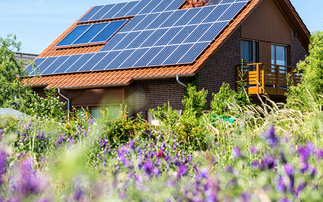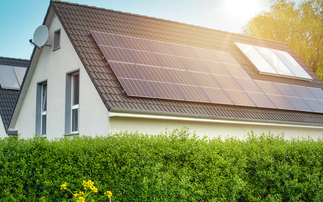
Steve Batty, director of sustainability at Equans UK & Ireland | Credit: Equans
Industry Voice: Equans' Steve Batty gives an overview of the findings from a £9m retrofit project for hundreds of council homes in Leeds
When it comes to decarbonisation, we are (thankfully) hearing about a lot of projects which are getting off the ground, new funding pots from central government are announced regularly and there are plentiful options when it comes to the various measures you can consider when retrofitting homes, offices, or public buildings.
But what we don't hear enough are the real success stories, which could lend themselves to real change and act as a blueprint for success. Carbon savings are fantastic. Slicker technology is nice to have. But the true results I'm talking about lie in changed lives: a warmer home; safety from fuel poverty; and significant financial savings which all contribute to improved quality of life and mental health. These are the outcomes which drive our social landlord customers, and they are the outcomes we strive to deliver daily.
Decarbonisation doesn't always go together with tackling fuel poverty - just look at the difference in the gas and electricity prices - so it's important for social landlords to take a holistic view of retrofitting their housing stock - with the resident at the very centre of those plans - and look at a ‘whole house approach'.
We've had dramatic results as part of a £9m project with Leeds City Council to implement whole-house retrofits across 190 properties.
The whole-house retrofit has seen the flats' - 150 of which are council-owned - Energy Performance Certificate (EPC) ratings drastically improved to an A-rating - a level achieved by just 0.2 per cent of homes in England.
Despite recent price rises, residents of the properties are expected to have their bills cut by up to 70 per cent - saving them as much as £1,600 per year, based on 2021 energy prices.
To achieve these efficiency levels, new high-performance windows, doors and insulation were installed alongside specially designed ‘warm roofs' - keeping the homes warmer for longer and reducing the energy needed to heat them.
Inefficient, carbon-intensive gas boilers were replaced by environmentally friendly air source heat pumps, controlled by smart thermostats. In addition, the smart thermostats provide real time data allowing the landlord to monitor the performance of their stock and giving residents greater control and visibility of their energy use.
Top-floor flats also have newly-fitted solar panels, allowing residents to generate their own free electricity, and LED lighting has been incorporated throughout - all of which contribute to carbon emissions per property now being -0.1 CO2 tonnes per annum, compared to 2.8 CO2 tonnes per annum previously.
The project received funding from the government's Social Housing Decarbonisation Fund (SHDF) and is a shining example in demonstrating what can be done to decarbonise the UK's housing stock. It has really led the way when it comes to meeting the government's goals to upgrade fuel-poor, inefficient homes - taking what was some of the least efficient homes in the country, into some of the most sustainable homes in the country.
At a time when many are worried about recent energy price hikes, we're proud to be able to use our expertise to demonstrate how a ‘whole-house' approach to retrofitting homes can deliver outstanding results, that span more than aesthetic improvements and carbon savings.
The work has unquestionably changed lives for the better.
Susan Neale - one of the Holt Park residents to have work completed to her home - said: "This winter I won't be scared to have my heating on. My home is completely different now - it's warmer and quieter and I feel better knowing that I won't be struggling or worrying as much about my bills. I hope more people get the chance to have the same work done."
James Rogers, director of communities, housing and environment at Leeds City Council, said: "It is fantastic news that we have completed this project, which supports our ambition to deliver a range of significant environmental improvements for people living in 190 flats on the Holtdale estate. This will not only help us reduce carbon emissions and make the 190 homes on the Holtdale estate more energy efficient, but it will also play a huge role in helping to cut energy costs for people in these homes by up to 70 per cent. We know that unfortunately too many people suffer from fuel poverty in Leeds, and it's work like this that will help cut those costs and make real positive impact to people's lives."
Steve Batty is director of sustainability at Equans UK & Ireland.
This article is sponsored by Equans. For more information click here.







